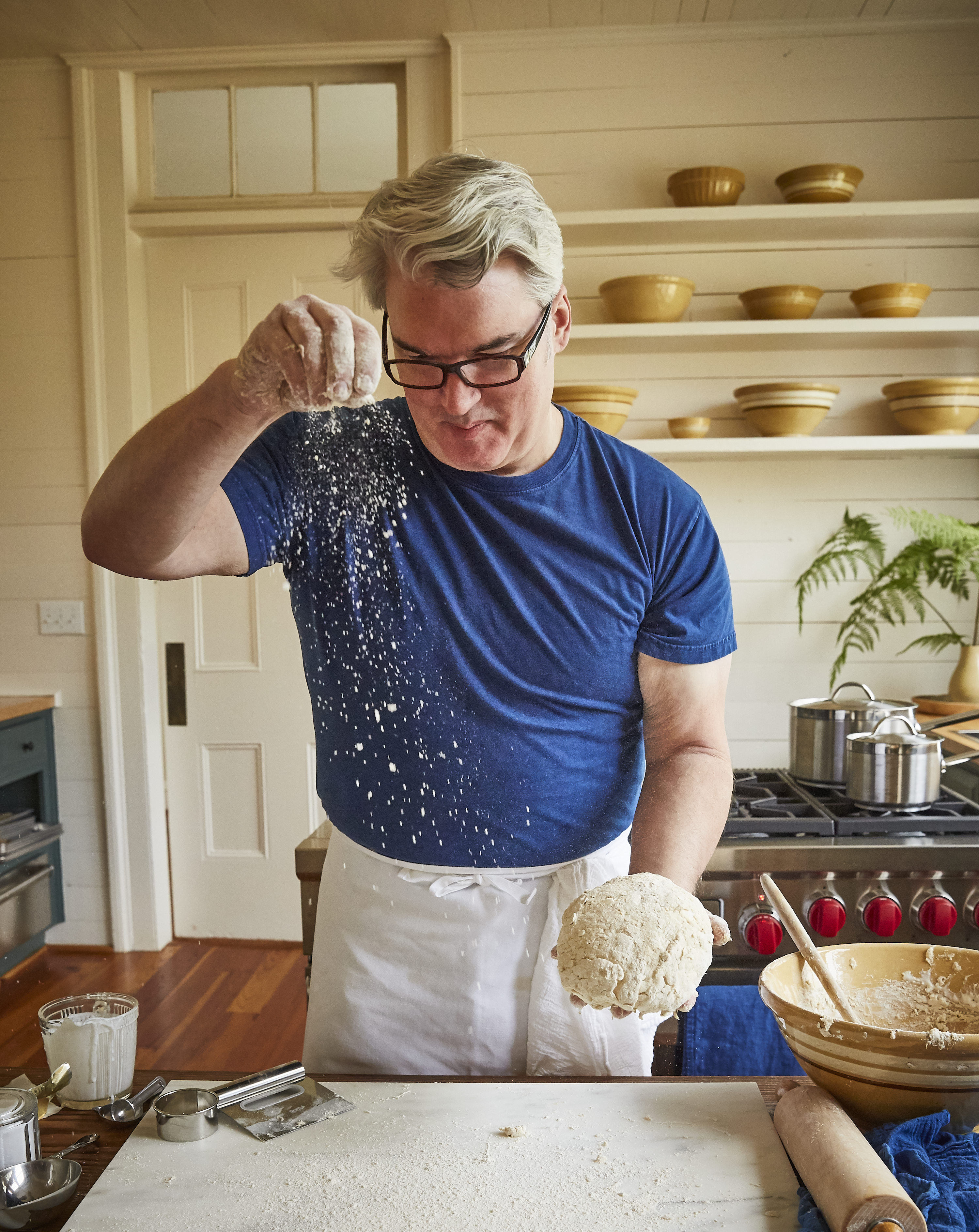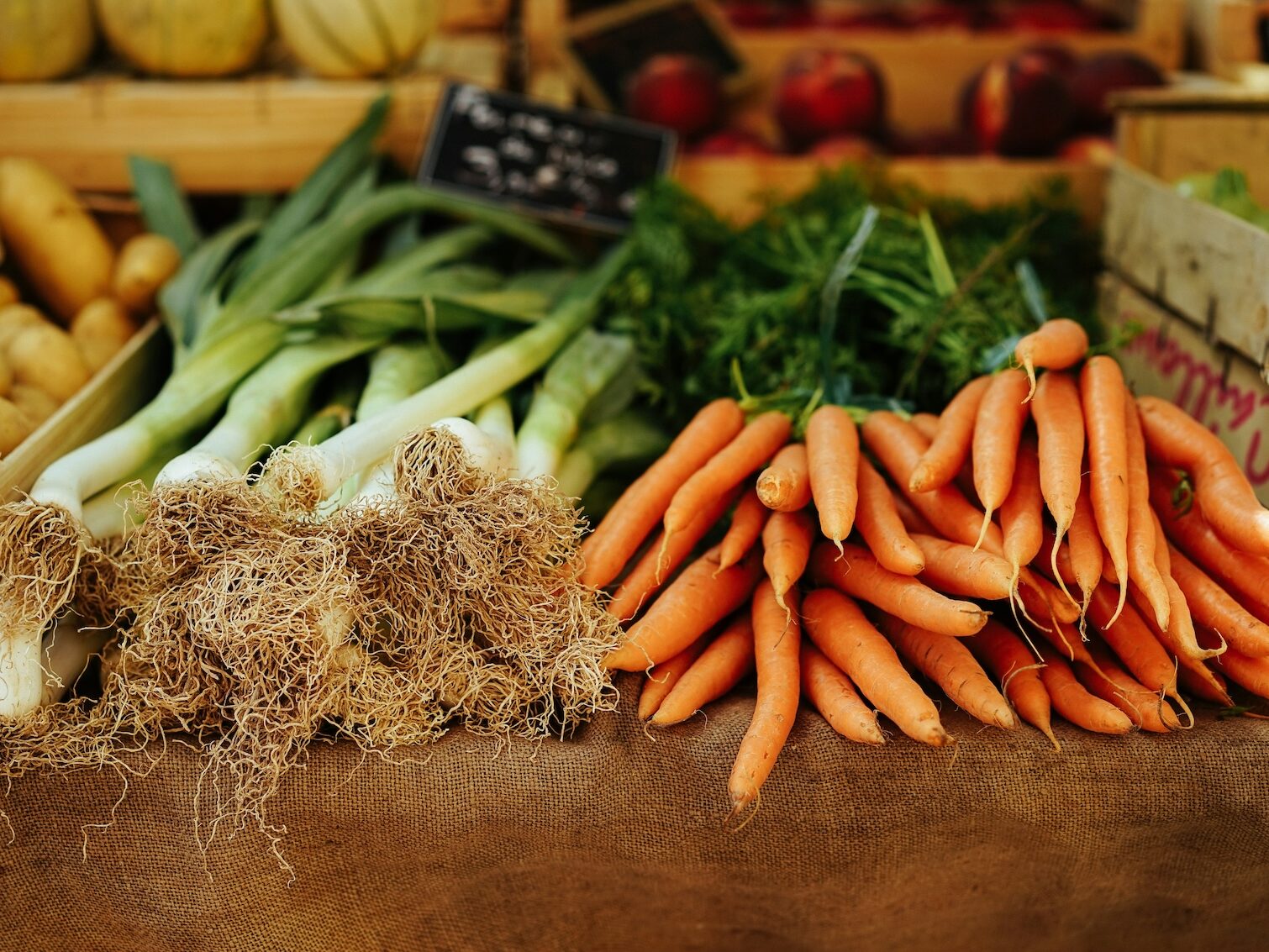The following is an excerpt from “Invitation to Notice,” a profile on Scott Peacock, the James Beard Award-winning chef who hails from the Wiregrass and now lives in Alabama’s Black Belt, in Marion. There, he offers the Biscuit Experience, which engages people in the nuances of rural Alabama, the practice of slowing down, and the art of “making biscuit.”
The Reverie House in Marion, Alabama, where Scott Peacock crafts a matchless biscuit-making experience for guests, once served as a headquarters for Union troops. The street holds its own stories: a ravine where Nathan Bedford Forrest allegedly hid for two days on horseback, the sewing of the first Confederate flag, and the first printing of The Alabama Baptist newspaper. Beyond it sits the site where Jimmie Lee Jackson was fatally shot in 1965 by a White state trooper. Jackson’s death prompted a call among activists to carry his body to the steps of the capitol in Montgomery, transforming into the voting rights march from Selma.
So, understandably, “it’s the complexity of this place” that Peacock finds riveting: “How all these things could take place in such a small spot in the world.” And it’s all mixed up together on the same streets, like threads tangled in a tiny sewing box: voting rights and the stars and bars and wealthy plantation owners and enslaved persons.
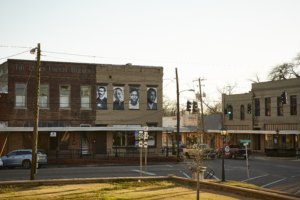
(Jennifer Causey/Contributed)
These are quiet and sometimes hidden histories that take a careful, attentive eye and plenty of time to discover. Peacock, who wields an expansive understanding of Marion’s past at every era, learned all of this “very slowly,” and when I ask what he’d like people to understand about rural Alabama, he answers, “Which rural Alabama?” Because the complexity and nuance carry forward to today. Marion (pop. 3,100) boasts two local newspapers with distinct editorial tones. An imposing courthouse sits at the center of town, flanked by a mix of Greek Revival estates, Black-owned businesses, and country churches.
Likewise, Peacock not only digs into Marion’s past, he sinks roots in its present. Shortly after arriving, he met Ethel Waite, a Marion native who spent decades away before moving back. Waite is a leader and force in the Black community who, on Juneteenth several years ago, discovered she had just purchased the antebellum house of the man who enslaved her ancestor. She and Peacock first got to know each other at a “transformational tea” held on Waite’s front lawn, and the two enjoy exchanging seasonal foods and comparing food traditions. It’s these kind of friendships, between seemingly disparate people in small spaces, that rural Alabama regularly births, but rarely gets credit for.
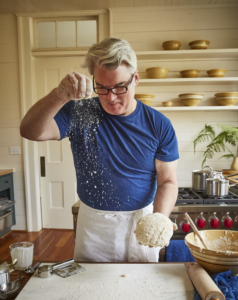
(Jennifer Causey/Contributed)
As Peacock’s connection to Marion deepened, so did the urge to share the intrigue of this place with others. “I understood that I could do things here that I couldn’t do anywhere else,” he says. “I didn’t know what they were exactly but I also knew I didn’t need to know that. I had enough behind me to see how that drive had served me so well. I knew what was true about that feeling, that I could trust it. And I loved the idea of introducing people to this area and celebrating it. Quietly.”
Peacock does not intend to make sense of rural Alabama. He doesn’t deal in simplifications; nor does his home state. Rather, he sees his role as sitting with Marion, to learn about it and from it. “It’s a gift to be able to share something that fascinates you,” he says. “And I’m certain that much of all this is me trying to understand it myself.”
As a chef, Peacock seeks this understanding through the lens that comes most naturally — cooking — and in particular, making biscuit, which mimics the multiplicity of Marion and of the South as a whole. “Biscuit is an iconic food,” he says. “It’s a symbol. It’s emblematic, and it’s infinitely complex. It’s a simple thing that most of us think we have an understanding of, or grasp on, but it’s not just one thing. There are so many iterations; there’s no such thing as the one true biscuit. It is so expressive of the maker, of the culture, of place.”
Thus, in his biscuit, Peacock blends “two different flours from two different antique wheat varieties that most people have never tasted.” The wheats are heirloom and organic, milled using historic processes. Peacock reflects on these distinctive flours during the Biscuit Experience, and on Marion, his personal story and childhood in Hartford, Alabama, the history of biscuits and of the South; it’s a jumble of memory and culture and experience.
“I do like to think sometimes when I’m in the act of making biscuit that I’m connected in some way to that tradition of people who were making something for their families,” Peacock says. “Often under the gun, often with complicated circumstances. And that feels like a real privilege. I’m drawn to that. That’s meaningful to me. It’s one of those foods that over centuries in the South meant an awful lot to a lot of people.”
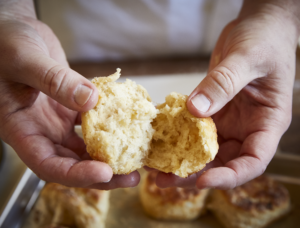
(Jennifer Causey/Contributed)
And, so, the Biscuit Experience is “very much about emotion for me,” Peacock says. “And it’s very much about giving attention. The act of cooking is very grounding, especially if you’re not having to rush. If you can really be mindful. It is a meditation. I find it to be a very connective experience and connecting. Even though I’m trying to demonstrate certain details, even though I’m acting outside the bowl as much as I am in it, in that process, what is happening in that bowl and myself is very calming and grounding and affirming.”
Being present, Peacock adds, is “a practice. The more you notice, the more you notice. It is a discipline of a sort. You have to make time for it.”
The act of noticing can also reach beyond the present, into the realms of memory and the past. For Peacock, making biscuit enabled him to see his father’s mother, Grandmaw Peacock, anew. As a child, he was embarrassed by her poverty and eccentricity. “She was a real character,” Peacock says, “always playing jokes, always keeping people off balance.” Now, he sees her as “this really tender-hearted person who was born into circumstances that didn’t allow her to lead a tender existence.”
“She was surviving,” Peacock says. “As husbands were dying and children were being killed in war or by disease, the burden fell on her to hold it together. And I think that outrageousness, playing jokes, keeping things off-kilter was a way that she coped.” And yet, “when she was cooking was really the only time she wasn’t frazzled. She was calm and focused and seemed connected to something bigger. She is a heroic figure to me now,” Peacock says. “So, in that way, making biscuit is also an act of reconciliation for me.”
All of this runs in the current of the Biscuit Experience, which evolves and ebbs and flows each time Peacock guides people through what’s both a simple and intricate endeavor. “The biscuit, it’s just one thing,” he says. “It’s so much more than a biscuit and it’s also just a biscuit.”
An extended version of this piece is available at alabamahumanities.org/mosaic. Learn more about the Biscuit Experience at chefscottpeacock.com.
Note: This story is reprinted from the 2023 issue of Mosaic magazine, published by the Alabama Humanities Alliance. Read the issue in full at alabamahumanities.org/mosaic.
Photos by Jennifer Causey
